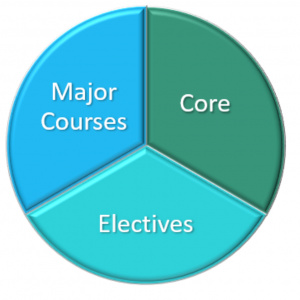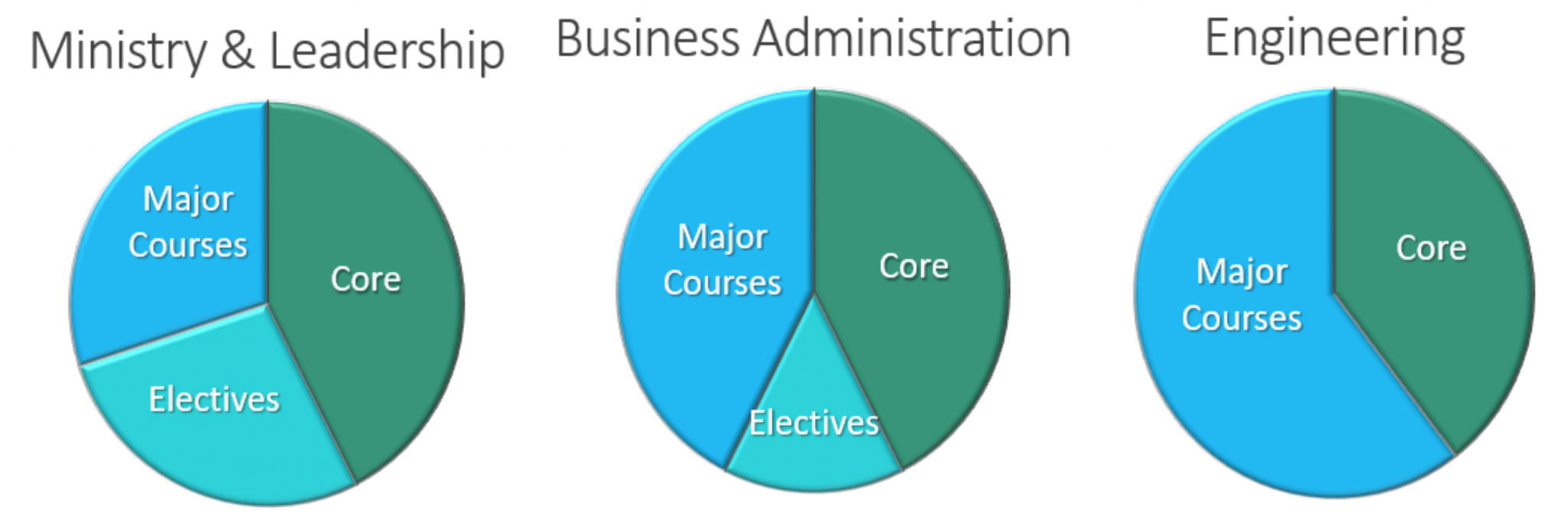Many students — an estimated 25–50% in fact — come to college unsure of their major. Another 75% choose a major, hope that they will like it but change their major at least once before graduation. Others choose not to declare a major and take core classes their first semester. Perhaps the best idea if you are unsure of your major is to start with something you care about.
Declaring a major is not the most important step. The best thing you can do if you are unsure is to take courses that allow you to explore your options.
Your college program is really made up of three parts — your major, the BJU Core and electives.

For the most part, the BJU Core is the same for everyone. It’s tempting just to take those courses and put off any major courses until you are sure. This is not usually the wisest decision. Instead, you can take courses that pique your interest. If you decide that you don’t want to major in the subject area, those courses can probably count toward your electives in another major.
However, you should know that in certain programs, like STEM (science, technology, engineering and math) or pre-professional programs, there aren’t very many elective credits. If you think you might be interested in a specialized major (health professions, computer, music, education, etc.), it is wise to take one or two required courses for that major your first year. If you do that, you may avoid having to stay for extra semesters later.
I like to think of our programs on a spectrum that range from flexible to specific. Here are a couple of examples to show you the way electives play into the various programs.

As you can tell, ministry and leadership is very flexible. Because of that, it is an excellent match if you want to double major. Engineering is on the other end of the spectrum. To complete all of the major courses you won’t have room for any electives. Business administration is a good example of a major that fits between the other two.
For most majors, you have until the end of your first year to decide what you’d like to do. But, for those pre-professional majors like accounting, education, culinary arts, engineering or premed/predent, you need to hop into them right away.
All of these possibilities may seem overwhelming, but your first-year advisor is here to help you talk through all your options. One thing that may help you decide what to do is to ask yourself these questions (Johnson & Cayton, 2017):
- What do I love to do? When you are doing this activity, you lose track of time, and when it’s over, you cannot wait to do it again.
- What can I do well? Sometimes this is the same answer as question one, but not always. This would be something that you can learn quickly and easily. Maybe it’s a subject in school that your friends struggle with, but it just makes sense to you.
- How can I help other people by doing this? Who do you like to serve? Children, teenagers, adults? The disabled, sick or homeless?
- Will someone pay me to do this? Here’s where the rubber meets the road. You have to be able to support yourself.
We believe that God has gifted each of us to fulfill His purpose, and even people with the same talents and gifts don’t use them in the same way. That’s what is so great about your first year of college. You get the opportunity to examine what you’re good at and learn how to use your gifts for Christ’s kingdom.
Explore the programs available at BJU at bju.edu/programs.
Reference:
Johnson, B., & Cayton, M. D. (2017, November 17). Find your why: Meaningful work, meaningful future, meaningful life. [Presentation]. https://lifedesigncatalyst.wordpress.com/presentations/








